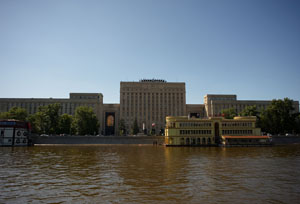It was definitely coming, even inevitable. The final act began about two weeks ago with a raid on Rosoboronservice, state-owned company under the Russian ministry of defence and ended this week with the dismissal of Russia’s defence minister, one of the top powerful men in the government, presumably as a result of the investigation of the alleged fraud in his ministry. What happened in between illustrates how big ministries with vast resources that use national security to limit public scrutiny are simply a scandal waiting to happen.
I am not going to read the runes to discuss why the scandal broke now, rather why the system allows opacity like this to flourish.
In the past few years, many of the government ministries have come under public scrutiny, which allows civil society and the media more oversight of their activities. However, the ministry of defence still operates under a cloak of secrecy while overseeing vast resources.
Without oversight and transparency that inevitably invites one corruption scandal after another, especially when cronyism becomes almost a norm.
At issue is the lack of transparency around the various state-controlled businesses and their subsidiaries within the ministries. Because of the secrecy it is impossible to know what is going on behind the closed doors and how vast are the networks of inter-related companies.
In 2011 there was a push to create more public transparency of state-owned corporations, but because of the same secrecy it is very difficult to tell how the new rules were implemented in companies related to the ministry of defence, if at all.
What the story also illustrates is the tremendous scope for conflict of interest in an opaque system. Public officials and parliamentarians often are involved in outside businesses, a situation that must be changed but carries on regardless.
There should be registers of interests, and in some ministries these exist, but these are not made public. All we are told is that people inside the ministries have registered their interests; we are supposed to take this on trust.
I am afraid that is not good enough. The ministries should not only publish a register of interests but make it as broad as possible so that it includes information about businesses held by family members and also broader connections.
It would also be extremely interesting to see a complete flow chart of ministries including all related companies and institutions to see exactly what they own and who controls them. I fear the complexity of cross-connections might make it almost impossible to decipher.
Registers of interests and organisational maps obviously won’t stop corruption by themselves. There needs to be permanent oversight and transparency or it won’t work. Unfortunately, as we see this week, it is not enough to trust our public servants to control themselves; we need to pull back that cloak of secrecy so we can watch them do it.
















 Connect with us on Facebook
Connect with us on Facebook Follow us on Twitter
Follow us on Twitter